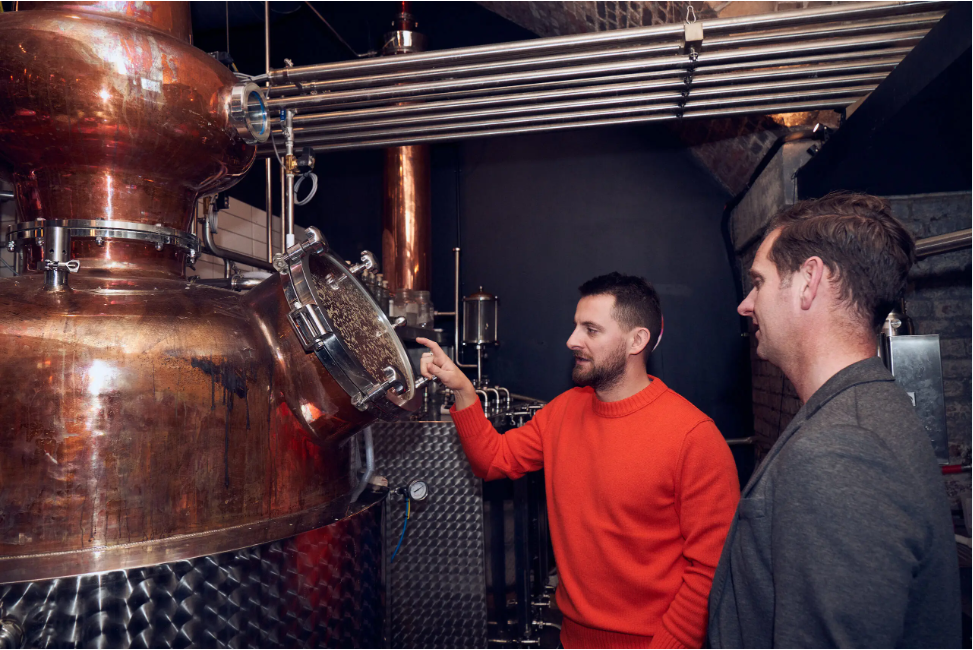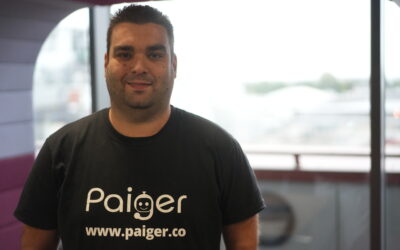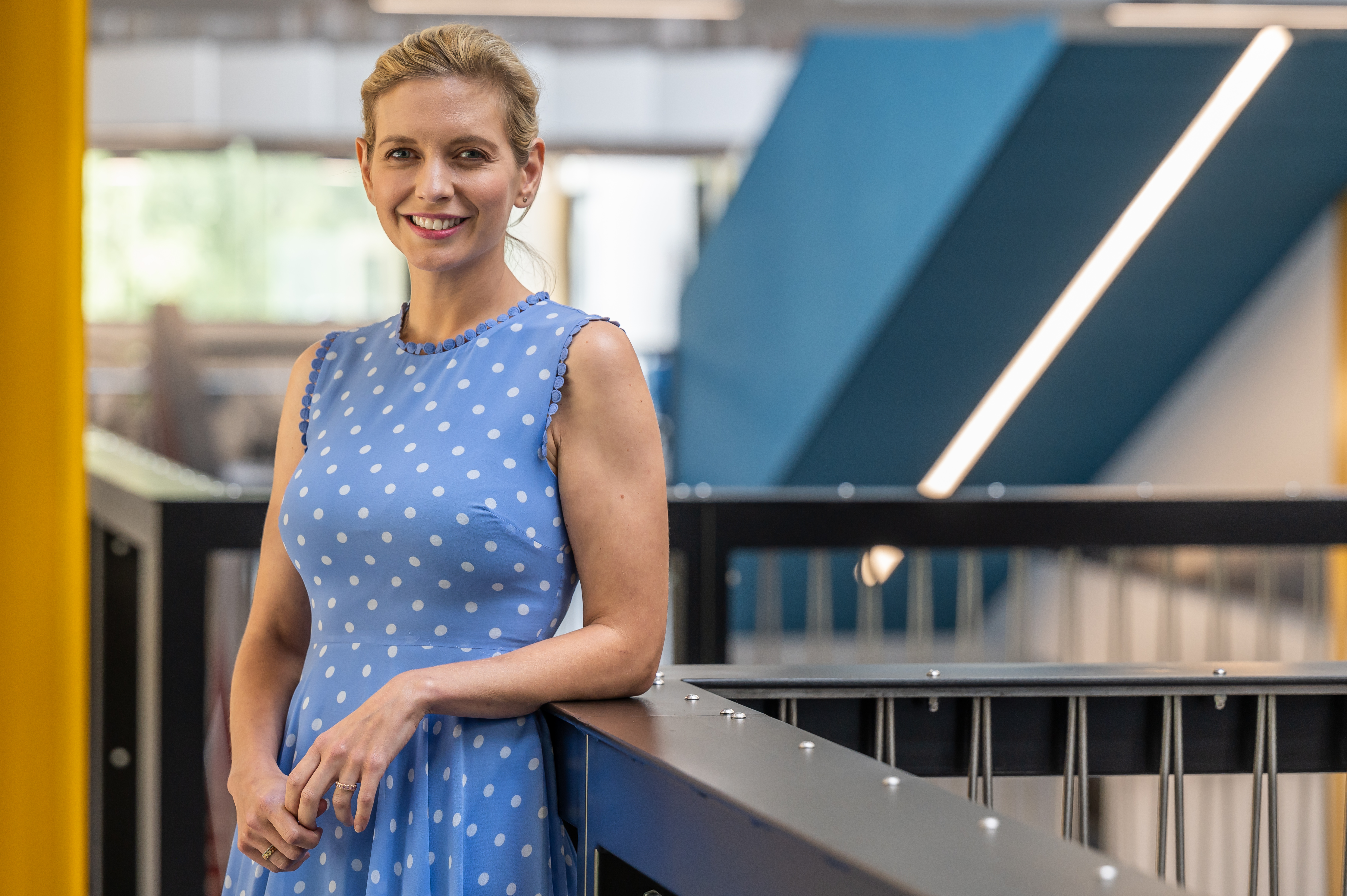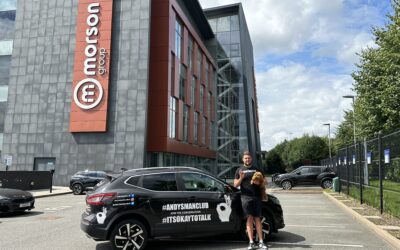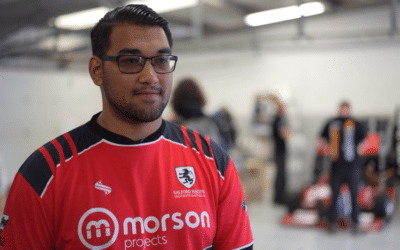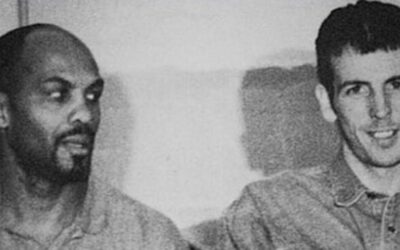We’re on a mission to uncover the journeys of a range of professionals who have followed a non-linear path to success. In this interview, Morson COO Adrian Adair speaks with the co-founder of Manchester Gin, Seb Heeley on his journey from property development to master distiller and business owner.
Jen Wiggins and Seb Heeley started distilling gin in the dining room of their Chorlton home, with an initial run of just 100 bottles. The Christmas of 2016 the couple “distilled for 24 hours straight for 11 days to keep up with demand. We slept in two-hour stints at a time.” Fast forward 6 years and Seb and Jen have opened a Manchester city centre cocktail bar and distillery to keep up with huge demand. Their internationally recognised hero product, Manchester Gin, is one of the most awarded gins in the UK, selling over 100,000 bottles per year in the UK alone.
Just like its gin, the brand’s founder Seb is gimmick-free, authentic and future-facing. In the stunning surroundings of their Manchester bar, Three Little Words, we chat about finding love and a business over a G&T, the work-life balance challenges of simultaneously nurturing a young business and a young son and consider ‘quiet quitting’ vs. finding purpose.
ADRIAN: We last met earlier in the year in less relaxed surroundings – on the panel of a North West Insider Business event. You spoke so passionately about your business and I enjoyed hearing about how you and your wife founded Manchester Gin. So let’s start there…
Seb: I started the business in 2016 with (my now) wife. But the idea starts way earlier. In February 2013 I was out with two of my friends… it was about half one on a Wednesday morning (yes, a school night!) and my two friends were chatting up two women. Feeling left out, I said I was going to speak to the nearest unattended woman! And there was Jen, sitting 10 feet away from me. I walked up and the first words I ever said to her were “What are you drinking?”, and the first words that she ever said to me were “Gin and tonic.”
Some classic foreshadowing there… it was meant to be!
The conversation turned into a very pretentious chat over who knew the most about gin … “this botanical doesn’t go with that one etc.” … and that started our whole love affair. Fast forward a couple of years to 2015 and we’d decided to open a bar together.
I used to work for a property developer, so the idea was that he’d buy the site (he didn’t know this), redevelop it all, and then I was going to quit and open the bar. In researching the bar, we came across what I would call ‘true small batch gin distillation’ which are tiny stills of around 30 litres. It was the first time I’d ever seen gin being made in a little back room (probably 2m x 2m). And that was our proverbial light bulb moment… we said “We’ve got a free summer, we can give this a go.” It took us 12 months to get all the licenses. When we managed to launch our first gin in 2016 our distillery was actually in our dining room, because we didn’t have a great deal of start-up capital. Our first still, which we call Wendy (who we still use to this day) was installed there, she’s a little 60 litre still which would make 100 bottles of gin.
It’s the perfect origin story – your love of gin meets the love of your life. So what’s it like being a husband and wife team, do you have dedicated roles and responsibilities?
Yeah. I try to do as little as possible!
We always say we’re that irritating couple that actually gets on. Working side by side is never a problem and we’ve worked closely for the last seven years, every single day going home, waking up, going to sleep, always together.
As to roles, I try to do one thing once badly and then I don’t get asked again! So accounts I can’t do or anything that involves being precise and accurate, that’s Jen’s skill set. Generally, I’ll do everything that’s outward facing such as distillation, new product development, and running the distillery team.
It’s good to have complementary skill sets, makes for a great team.
Well, we always say that we complement each other. Jen will focus on the minutiae (we always say that she’s the worrier) whereas I’m just left in my little dreamland coming up with various things. And it works really well.
We talk to other people that start businesses and I think unless there are at least two of you in the business, I think it’s incredibly hard to make a real decision. If there are two of you and you make decisions together, learn together and fail together, that’s how you find success.
And of course, you have added pressure of being partners in business and life, plus you have a little boy! So, I’m curious, as business owners and parents, how do you manage a work-life balance?
I don’t think there is one in all honesty. When I was in transition from leaving a job I’d been in for nine/ten years to running my own business I remember going on a 2 week holiday and my old boss said ‘Have a great break.’ I remember saying ‘I’ve got to take the laptop to design Christmas sets’ and he said, ‘Welcome to the business owners club.’ When you start your own business there’s no work-life balance because it is your life, it’s all on you. If the work doesn’t get done, you don’t make any money and you can’t provide for yourself and your family.
Work-life balance is a funny thing – particularly for business owners. It’s quite a polarised term, suggesting that you’re not living when you’re working but if you’re passionate about what you do, you’re engaged in what you do, whether you’re an employee or an owner, you find balance. It’s often about what you feel is acceptable.
I agree, this business is our baby, and we love it. I remember a time a few years ago, I think it was my birthday and we said, listen, we’re going to have a nice lunch and we’re not going to talk about work. We sat at a bar not dissimilar from this one and we were chatting away with the barman and ordering cocktails. That lasted about 4 minutes before we were looking behind the bar saying “I quite like that spirit bottle because of the shape” then an hour passed and all we’d done was talk about work – we’d failed!
But like you say if you are passionate about what you do then there is no work-life because it’s just life and this has been our life for the last seven years now. So, you know, we’re always talking about work, talking about ways of making it better, we don’t stop. On the flip side, because we’re business owners we can take Fridays off, we can spend quality time with our son when he needs it, and we can do the school run – we wouldn’t have it any other way.
Any advice for a couple exploring whether to go into business together or not?
Make sure you love each other if you really get on each other’s t*ts, don’t ever do business together. It will test your relationship and you have to fully commit to it. But if you do love each other and you want to spend time together and spend every day talking about it, then go for it. I mean, it’s the best thing we’ve ever done. But it’s like having a child, if you’re not completely in love don’t have a child, because that will break your spirit instantly.
And what do you think is the one key ingredient to a successful family business other than love and passion?
Well, our business motto is ‘f*** it’. And as far as we’re concerned, that’s what we live and die by. When Jen first quit her job, it was ‘f*** it’, let’s do it.
What I mean by ‘f*** it’ is, just be bold in what you do. If you really think it’s worthwhile doing it, then do it. But ultimately, if it was easy everyone would do it. When I first started working on the business my friends would say ‘Why would you bother to do this?’ My old boss was the same, when I got my first still got delivered to my office he told me I was an idiot… he took that back 4 months later!
I think this ‘being bold’ rhetoric just says everything about you. When we were on the panel together at that Northwest Insider event your desire to succeed came across so strongly. Do you mind me asking, where does that come from?
Honestly, it’s a desire not to fail. I always wanted to start my own business growing up, conversely, Jen wasn’t that massively enthused about it and it wasn’t a big driver of hers.
I think it just comes from always wanting to do something new. If you discover something you love, why wouldn’t you put your all into it? Why wouldn’t I want to make a whisky next, why wouldn’t I want to build a new distillery? Once you’ve done one thing, it needs to roll onto the next. For us, the development of our brand isn’t a game plan, it’s a natural progression.
That’s so interesting to hear you say that. At Morson, one of our core values is curiosity. We want our people to know that by being curious, and inquisitive you’re making yourself and your business better, and more successful.
Yeah, exactly. You must always be on the lookout for what’s new, and what’s coming. Two years ago, we didn’t have the ambition to go into whisky but in the next six/seven years it’ll probably become the focus of the whole business. So, you’ve just got to roll with what’s moving, what’s changing, and how your passions change and evolve.
So, whisky is firmly in the pipeline?
Well, I always say, and I stand fast in this, I still don’t know what I want to do when I grow up. And I don’t think I’ll ever know. But I love this business, I love making alcohol – the next ten years will revolve around whisky. We call it a super distillery. It’ll be capable of producing half a million bottles of whisky a year. Compared to Scotland, that’s considered very small. So we would be a cottage industry business to Scotch Whisky and but we’ll be in the top three or four producers of English whisky. So our ten-year goal is to produce one of the world’s best whisky and grow internationally with that brand.
The still behind us is a thousand-litre still that can make a million bottles of gin. Our 750-litre whisky still can only make 40,000 bottles. So we need a 15,000 square foot space to make the equivalent amount of whisky to gin. So the focus for the next two to three years is to get a new distillery up and running and fire into production because you’ve got to wait at least three years for it to mature into whisky.
Will it be Manchester’s first whisky?
I mean Macclesfield have a whisky and the guys at Forest Gin, but that’s Cheshire, so yeah, Manchester’s first. But also the best, I want to produce the world’s best whisky, you know, just a small feat…
You’ve got guts and ambition. It’s great. Whilst we’re talking about the future, what would you like your son to follow in your footsteps?
You know what, I just want him to do what makes him happy. Jen and I always talk about how amazing it is to see his personality developing and coming through. He’s four now and in reality, the job he’s most likely to do doesn’t even exist right now. When I think when I was a child, social media didn’t exist now I employ three people in our social media team – a job that didn’t exist 20 years ago.
I’d like him to be in control of his own life, which for me meant running my own business when however hard you work is usually a direct correlation to how much you earn. But money is not the be-all and end-all. Genuinely, I would say, as long as he’s happy, that’s the most important thing.
When we were on the panel, you spoke about legacy. The fact that you wanted to create a business that is still going and growing when your son is older. Is that a driving factor?
Yeah, the way we’ve built our brands is for longevity. It comes back to my old days in property. The reason I went into the property was to build a building that outlived me. I wanted my children, and my grandchildren to go and see that building, and say “Granddad built it” and it’s the same thing with our brand. I have no interest in him running this business, he has to go and live his own life, as I did. We’ll always have our family name on the back of every bottle we produce and it’ll be something that he (hopefully) is very proud of. But he doesn’t need to run this business if he doesn’t want to.

